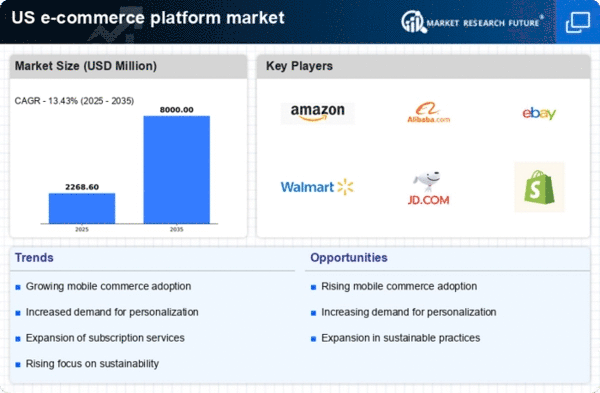Rise of Social Commerce
The e commerce-platform market is witnessing a significant rise in social commerce, where social media platforms are increasingly becoming sales channels. In 2025, it is projected that social commerce will contribute to over $50 billion in sales in the US alone. This trend is driven by the growing number of consumers who prefer to shop directly through social media, influenced by peer recommendations and targeted advertisements. The seamless integration of shopping features within platforms like Instagram and Facebook is reshaping consumer behavior, making it easier for brands to reach their target audience. As social commerce continues to evolve, it is likely to play a pivotal role in the expansion of the e commerce-platform market, offering new avenues for customer engagement and sales.
Emergence of Subscription-Based Models
The e commerce-platform market is increasingly adopting subscription-based business models, which offer consumers convenience and value. This model allows customers to receive products or services on a recurring basis, often at a discounted rate. In 2025, it is projected that subscription e commerce will generate over $20 billion in revenue in the US. This trend is particularly prevalent in sectors such as beauty, food, and digital services, where consumers appreciate the predictability and ease of access. As more businesses explore subscription offerings, this model is likely to reshape the competitive landscape of the e commerce-platform market, fostering customer loyalty and consistent revenue streams.
Increased Focus on Customer Experience
In the e commerce-platform market, there is an increasing emphasis on enhancing customer experience. Companies are investing in user-friendly interfaces, faster loading times, and personalized shopping experiences to retain customers. Research indicates that 80% of consumers are more likely to make a purchase from a brand that offers personalized experiences. This focus on customer satisfaction is driving businesses to adopt advanced analytics and customer feedback mechanisms to tailor their offerings. As competition intensifies, the ability to provide a superior customer experience is becoming a key differentiator in the e commerce-platform market, potentially leading to higher conversion rates and customer loyalty.
Expansion of Logistics and Fulfillment Services
The e commerce-platform market is significantly influenced by the expansion of logistics and fulfillment services. As consumer expectations for fast and reliable delivery continue to rise, companies are investing heavily in their supply chain capabilities. In 2025, it is anticipated that the logistics sector will account for nearly 15% of total e commerce expenditures in the US. This investment is aimed at improving last-mile delivery solutions and reducing shipping times, which are critical factors for customer satisfaction. Enhanced logistics capabilities not only facilitate quicker order fulfillment but also enable businesses to scale operations efficiently, thereby driving growth in the e commerce-platform market.
Technological Advancements in Payment Solutions
The e commerce-platform market is experiencing a notable shift due to advancements in payment technologies. Innovations such as digital wallets, contactless payments, and blockchain solutions are enhancing transaction security and efficiency. In 2025, it is estimated that mobile payment transactions will account for approximately 50% of all e commerce transactions in the US. This shift not only streamlines the purchasing process but also caters to consumer preferences for convenience and speed. As payment solutions evolve, they are likely to attract a broader customer base, thereby driving growth in the e commerce-platform market. Furthermore, the integration of artificial intelligence in fraud detection is expected to bolster consumer trust, which is crucial for sustaining market momentum.

















